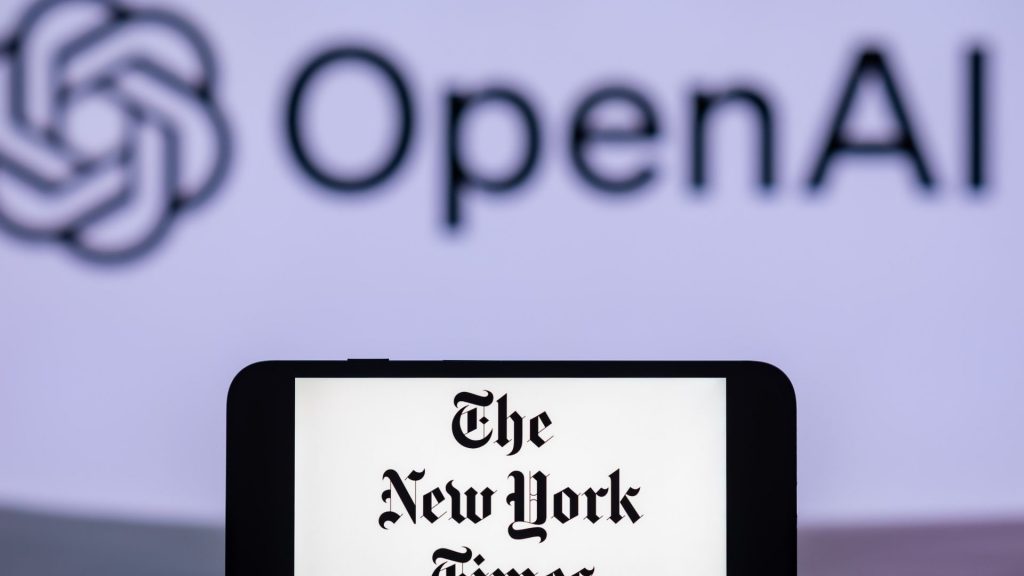OpenAI can’t shake New York Times content lawsuit, judge says
Ella Greene March 27, 2025 0
- A judge ruled that OpenAI and Microsoft must continue to defend against a New York Times’ lawsuit alleging copyright infringement. However, the judge dismissed some claims, like “abridgment.”
- The case’s outcome could set a precedent for how AI platforms use copyrighted material. It could either restrict or permit the use of such content to train chatbots.
- Microsoft argues OpenAI’s use of journalism constitutes “fair use” and that it has also secured agreements with publishers like Conde Nast and the Associated Press to train its platforms legally.
Full Story
In a case that could change how artificial intelligence (AI) platforms gather information, a judge has ruled that OpenAI and its parent company, Microsoft, must continue to defend against the New York Times’ copyright lawsuit. Judge Sidney Stein, a federal judge in the Southern District of New York, allowed the suit to continue but did narrow the scope of the case.
The lawsuit was originally filed in December 2023. The paper accuses OpenAI of violating copyright laws by using articles to train its program without permission or payment. The paper said in its complaint that OpenAI learning from the millions of articles published threatens its viability since people wouldn’t subscribe to the paper if they could get content from a chatbot.
Attorneys for the news outlet reacted to Wednesday’s decision.
“We are very pleased with Judge Stein’s ruling, determining that we can proceed on virtually all of our claims,” said Steven Lieberman, attorney for MediaNews Group and Tribune Publishing, in a statement to Straight Arrow News. “We appreciate the opportunity to present a jury with the facts about how OpenAI and Microsoft are profiting wildly from stealing the original content of newspapers across the country.”
Stein heard arguments to dismiss the lawsuit in January.
In the ruling, Stein said that the primary claim of copyright infringement would continue but dismissed other aspects of the lawsuit. They include a claim of “abridgment” by the Center for Investigative Reporting (CIR). CIR and The Daily News joined their legal challenges to that of the New York Times.
Representatives for the Times stressed that the narrowing of the lawsuit doesn’t affect the primary claim of copyright infringement by OpenAI.
“The claims the court has dismissed do not undermine the main thrust of our case, which is that these companies have stolen our work and violated our copyright in a way that fundamentally damages our business,” Frank Pine, executive editor of MediaNews Group and Tribune Publishing, said.
What are the ramifications of the ruling?
The ruling could either open or close a pathway to how AI chatbots are trained. If the paper proves that AI use of its copyrighted material is unlawful, it could hinder companies from allowing their programming to skim the internet as a learning model. Should Microsoft fend off the lawsuit, it could become de facto legal permission to use copyrighted sources across the world to enhance chatbots.
In February, a Delaware judge ruled that Ross Intelligence is liable for copyright infringement of content produced by Thomson Reuters.
Does ‘fair use’ apply?
Microsoft’s attorneys have argued that OpenAI’s use of published journalism amounts to “fair use,” a doctrine that protects the use of copyrighted material, including criticism, commentary, news reporting, teaching, scholarship and research.
The Times argues that the platform has relied on the paper’s content for much of its training. At one point, the plaintiffs prompted the AI to answer certain questions and received back what they contend amounted to a verbatim copy of Times content.
Deals cut
OpenAI has announced compensation deals with Conde Nast, People, the Associated Press and others to allow the platform to train on their content. OpenAI said these agreements will enhance its chatbot, ChatGPT, and its AI-powered search engine, SearchGPT, which launched in July 2024 to compete with Google for web traffic.
Related Stories
Ella Rae Greene, Editor In Chief
Ella Greene
Ella and the staff at Clear Media Project (CMP) curate these articles.
Unless otherwise noted CMP does not write these articles.
The views, thoughts, and opinions expressed in the articles published on this blog belong solely to the original authors and do not necessarily reflect the views of the blog owner. The blog owner does not claim ownership of the content shared by contributors and is not responsible for any inaccuracies, errors, or omissions.
All rights and credits goes to its rightful owners. No Copyright Infringement is intended. If you believe any content infringes on your rights, please contact us for review and potential removal.





